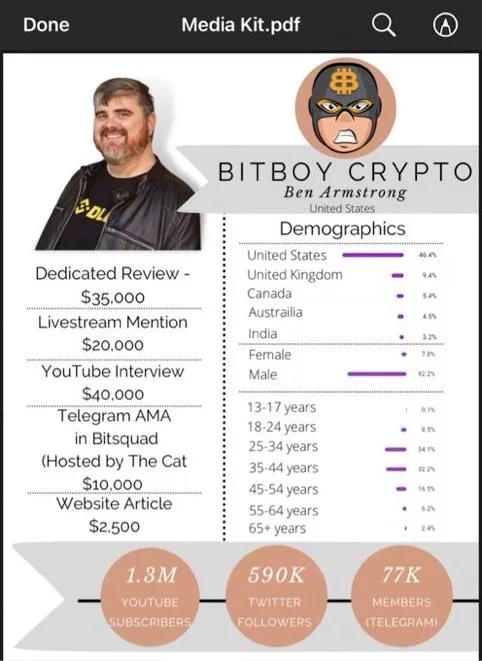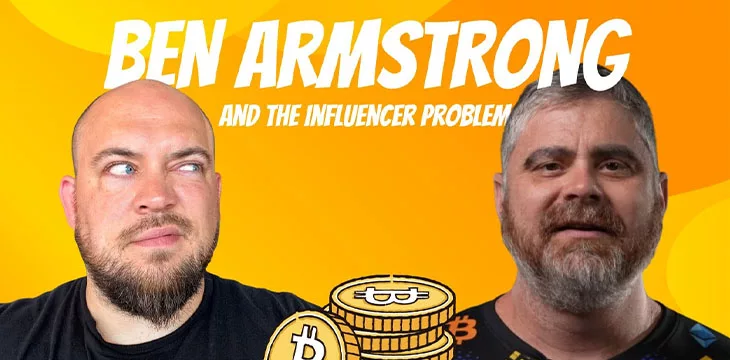|
Getting your Trinity Audio player ready...
|
Ben Armstrong is an interesting character in the blockchain economy because I think, like most people, he got into Bitcoin because it was an intriguing tool for internet businesses, but he let himself get sucked into the seedy underbelly of the ‘crypto’ economy as he quickly became an influencer in the space.
According to Armstrong, he bought his first bitcoins from Charlie Shrem’s BitInstant and lost them in Mt. Gox while using Bitcoin as a way to sell event tickets on Craigslist. Realizing there was not a lot of good educational material about Bitcoin, he started making content under the “BitBoy” brand which started as a nickname for Ben himself, but ultimately evolved into something of a ‘crypto’ media fiefdom of some significance over the last few years.
In 2018, the brand burst into the mainstream, and Armstrong became a voice for a subset of the crypto culture as a whole.
Even if Armstrong was initially driven by genuine curiosity, I believe he faces a common challenge shared by content creators in the field: a scarcity of substantial events. To maintain audience engagement, creators often resort to filler content, drama, and market pumps. He represents just one facet of a more extensive issue concerning content creators and influencers within the space.
Influencers
Logan Paul, Casey Neistat and Mr. Beast are examples of influencers in the social media game; earning their livings from a mix of streaming ads, product endorsements and other commercialization of their influence. They are nauseating enough with their publicity stunts and manipulation tactics, but in the ‘crypto’ space, the influencers are held to much lower standards because of the global nature of the industry.
Kim Kardashian, Floyd Maywether Jr. and other celebrities have been sued for their involvement in brazen crypto scams, and a swath of celebrities like Shaq, Tom Brady, Gisele Bündchen and Larry David were sued specifically for their involvement in promoting FTX. They deserve their criticisms too, but I think it’s relatively clear they were ignorant about the problems with the exchange.
In the meantime, financial YouTubers such as Erika Kullberg, Graham Stephen, and Tom Nash also faced lawsuits for endorsing FTX, alongside Ben Armstrong. This culminated in a rather comical episode where Ben camped outside Sam Bankman-Fried’s residence, wielding a bullhorn to voice his grievances regarding the collapse.
Let’s not even touch on the NFT scams by Lana Rhoades, the “SaferMars” token pump and dump by Souljaboy and some of the other nonsense in the space.
Crypto native scammers
Back to the original point, influencers like Ben Armstrong, Lark Davis, Ivan “On Tech” Liljevquist and Layah Heilpern have made their names and fortunes in the crypto influence game, peddling books, ad-sponsored reviews, and speaking appearances for big money.
In late 2022, a twitter account by the name of “ZachXBT” began posting some details about what goes on behind the crypto influencer curtain by pretending to be a new project looking for promotion from the BitBoy Crypto channel.
BitBoy sent along pricing and details.

In the classic crypto casino game, if a low-cap coin or token can get hyped up properly, it isn’t uncommon to see massive gains. But as people got tired of pump-and-dumps, the ICO and general “presale” economy crept up to replace it. In this world, the ONLY thing that mattered was marketing and message, and this is where Armstrong shined.
Armstrong would advocate for presale items or very newly launched tokens, while being paid for promotion, would help pump the price while founders would dump.
4/ Also in fall 2020 Bitboy worked with $DISTX a video he titled “my most trusted coin”
He went on to change the video title later on. The video also had zero promotion disclosure & project exit scammed.
The video is still up but don’t worry it has been archived safely by me. pic.twitter.com/ztol2aOSuQ
— ZachXBT (@zachxbt) January 3, 2022
This wasn’t some side-show to the BitBoy brand. It was the entire purpose of the brand!
Here’s a whole thread of Armstrong’s malfeasances documented by ZachXBT where, coin after coin, Armstrong makes videos, tweets and general promotion of a project until it pumps, then it dies, and then he generally deletes the content in hopes nobody will notice on the next endorsement.
3/ In Fall 2020 Bitboy worked with $MYX and even was warned by community members. Bitboy has since deleted the video. https://t.co/tGbyyjFiZ7 pic.twitter.com/NEs32Ygoeq
— ZachXBT (@zachxbt) January 3, 2022
Slowly, then suddenly
All of a sudden, Ben was out. BitBoy Crypto has fired him, and they are rebranding without him. The brand that became synonymous with Armstrong would have to pivot to get away from the association people make with the brand and the man. Citing drug use and other malfeasances, Ben wasn’t let go for chronic pump and dumping, front-running retail investors or fraud. It was apparently for something to do with his personal behavior that was seemingly impacting his work relationships or performance.
This is Ben.
TJ Shedd & Justin Williams have attempted a coup at my company.
Just confirming what is going around. It’s true. There has been a mutiny at BitBoy Crypto & Hit Network. But it won’t work. They have no leverage
Until they can clone me, I have nothing to worry about
— $BEN (@joinBENCoin) August 27, 2023
Ben appears to be working on rebranding himself, and looking to continue his schtick, so I expect it will continue on until more trouble comes his way from it all.
Lessons
In the blockchain economy, there is little incentive to build real value. There is a ton of incentive to lie, cheat and steal. At some point, it must all either come to a head and be destroyed, or it must create something that cannot be created any other way. Five years ago, I would have guessed Bitcoin would have been a lot more disruptive by now, and I assumed the crypto market would mostly have been washed out, but it persists, so we are either very patient or very crazy.
But that is a major tragedy! Bitcoin was invented to reduce the friction of global commerce and increase the integrity of data. In short, it was designed to bring us together to do honest and transparent business. As long as influencers trick retail into thinking the point of blockchain assets is to pump, the industry will remain a solution looking for a problem with tons of baggage and fallout happening along the way.
Bitcoin doesn’t need influencers. It needs focused, hardworking entrepreneurship.
Let’s tune out the noise and create something valuable!
Follow CoinGeek’s Crypto Crime Cartel series, which delves into the stream of group—from BitMEX to Binance, Bitcoin.com, Blockstream, ShapeShift, Coinbase, Ripple,
Ethereum, FTX and Tether—who have co-opted the digital asset revolution and turned the industry into a minefield for naïve (and even experienced) players in the market.

 07-12-2025
07-12-2025 





